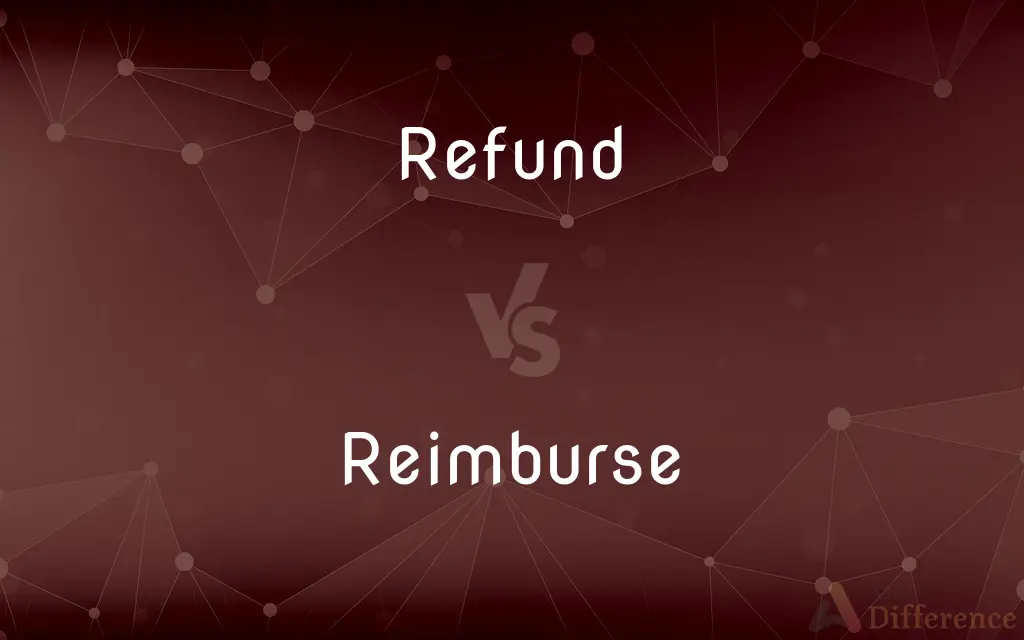Refund vs. Reimburse — What's the Difference?
By Urooj Arif & Maham Liaqat — Updated on April 20, 2024
A refund is the return of money previously paid for goods or services, typically to a customer, while reimburse involves compensating someone for an expense they have incurred.

Difference Between Refund and Reimburse
Table of Contents
ADVERTISEMENT
Key Differences
Refunds are usually issued when a customer returns a product or is dissatisfied with a service provided, leading to the return of the money they had paid. On the other hand, reimbursement involves paying someone back for money they have spent out of their own pocket, often related to expenses incurred during work or other approved activities.
Refunds are commonly seen in retail and consumer transactions where goods are returned within a specified period due to defects, dissatisfaction, or a change of mind. Conversely, reimbursements are typical in professional settings, such as business travel expenses, where employees spend their own money expecting to be paid back by their employer.
The process of getting a refund often requires proof of purchase and sometimes the return of the purchased item in resalable condition. In contrast, reimbursement generally requires submission of receipts or proof of expenditure to ensure the expenses align with the policies of the reimbursing entity.
While refunds are generally expected to be handled in a relatively short timeframe, dictated by consumer protection laws or company policy, the timeframe for reimbursements can vary widely depending on the organization's procedures and the nature of the expenses.
Refunds directly relate to a transaction reversal, often impacting the seller’s financial records as a return of revenue. Reimbursements, however, are typically logged as business expenses, reflecting compensation for costs borne by someone else, not a reversal of a sale.
ADVERTISEMENT
Comparison Chart
Definition
Money returned for a returned or unsatisfactory product/service
Money paid back to someone for expenses they incurred
Common Context
Retail, services
Business expenses, healthcare costs
Documentation
Receipt, proof of purchase
Receipts, expense reports
Financial Impact
Transaction reversal
Recorded as expense compensation
Timing
Often dictated by policy, quick
Can vary, sometimes delayed
Compare with Definitions
Refund
Subject to company policy or legal consumer rights.
The store's refund policy allows returns within 30 days.
Reimburse
Requires proof of expenditure.
Employees must submit receipts to claim reimbursements.
Refund
Often requires returning the product.
Most stores require the item back in its original packaging for a refund.
Reimburse
Compensation for expenses already paid.
The company reimbursed her for travel expenses to the conference.
Refund
Can be processed through the same payment method used.
Refunds are typically issued to the same credit card used for purchase.
Reimburse
Often governed by specific rules or budgets.
Reimbursements for meals are capped at $50 per day.
Refund
Return of money paid for goods or services.
She received a refund after returning the faulty blender.
Reimburse
Typical in professional and medical contexts.
His health insurance provided reimbursement for medical expenses.
Refund
Common in retail and consumer services.
He got a refund when the concert was canceled.
Reimburse
Can cover a wide range of expenses.
She was reimbursed for both mileage and hotel costs.
Refund
To give back, especially money; return or repay
Refunded the purchase price.
Reimburse
To repay (money spent); refund.
Refund
To make repayment.
Reimburse
To pay back or compensate (another party) for money spent or losses incurred.
Refund
A repayment of funds.
Reimburse
To compensate with payment; especially, to repay money spent on one's behalf.
The company will reimburse you for your expenses for the business trip.
Refund
An amount repaid.
Reimburse
To replace in a treasury or purse, as an equivalent for what has been taken, lost, or expended; to refund; to pay back; to restore; as, to reimburse the expenses of a war.
Refund
(transitive) To return (money) to (someone); to reimburse.
If you find this computer for sale anywhere at a lower price, we’ll refund you the difference.
Reimburse
To make restoration or payment of an equivalent to (a person); to pay back to; to indemnify; - often reflexive; as, to reimburse one's self by successful speculation.
Refund
To supply (someone) again with funds.
To refund a railroad loan
Reimburse
Pay back for some expense incurred;
Can the company reimburse me for my professional travel?
Refund
To pour back (something).
Reimburse
Reimburse or compensate (someone), as for a loss
Refund
An amount of money returned.
If the camera is faulty, you can return it to the store where you bought it for a full refund.
Refund
To fund again or anew; to replace (a fund or loan) by a new fund; as, to refund a railroad loan.
Refund
To pour back.
Were the humors of the eye tinctured with any color, they would refund that color upon the object.
Refund
To give back; to repay; to restore.
A governor, that had pillaged the people, was . . . sentenced to refund what he had wrongfully taken.
Refund
To supply again with funds; to reimburse.
Refund
Money returned to a payer
Refund
The act of returning money received previously
Refund
Pay back;
Please refund me my money
Common Curiosities
What is the main difference between a refund and reimbursement?
A refund is a return of payment for products or services, while reimbursement involves paying someone back for expenses they've incurred.
How long does it take to get a refund compared to a reimbursement?
Refunds are usually processed quicker, as dictated by policy, while reimbursements can vary based on administrative processes.
What types of expenses are commonly reimbursed by employers?
Common reimbursable expenses include travel, meals, and professional development costs.
Are reimbursements considered taxable income?
Generally, reimbursements for actual expenses incurred are not taxable, especially if they adhere to an accountable plan.
Can services be refunded?
Yes, services can be refunded, especially if they did not meet the promised standards or were cancelled.
What is an expense report in the context of reimbursements?
An expense report is a document or form used to claim reimbursements, detailing the expenses incurred and including the necessary receipts or proof.
Can a refund be denied?
Yes, if the return conditions are not met, such as returning outside the policy window or without proper packaging.
What happens if an expense exceeds a company's reimbursement policy?
Employees may only be reimbursed up to the policy limit, and any excess could be out-of-pocket.
How do consumer protection laws affect refunds?
They ensure that consumers can return faulty or unsatisfactory products within a certain period for a refund, protecting consumer rights.
Can you get a refund without returning the product?
Typically, physical products must be returned to receive a refund, though services or digital products might have different conditions.
Is a receipt always necessary for both refunds and reimbursements?
Yes, most refunds and reimbursements require receipts or proof of purchase/expenses to process.
What documentation is crucial for both refunds and reimbursements?
Receipts and proof of purchase are essential to process both refunds and reimbursements effectively.
What is the role of company policy in refunds and reimbursements?
Company policy dictates the terms, conditions, and procedures for both, ensuring consistency and clarity in financial transactions.
Why might a company offer reimbursements instead of paying directly for expenses?
It allows for flexibility and ensures that employees only spend money on approved costs, helping manage the budget more effectively.
Can you be reimbursed for a product instead of receiving a refund?
Yes, in some cases, such as when a defective product is purchased for business use and the cost is covered by the company.
Share Your Discovery

Previous Comparison
Coach vs. Coacher
Next Comparison
Pretexting vs. PhishingAuthor Spotlight
Written by
Urooj ArifUrooj is a skilled content writer at Ask Difference, known for her exceptional ability to simplify complex topics into engaging and informative content. With a passion for research and a flair for clear, concise writing, she consistently delivers articles that resonate with our diverse audience.
Co-written by
Maham Liaqat













































